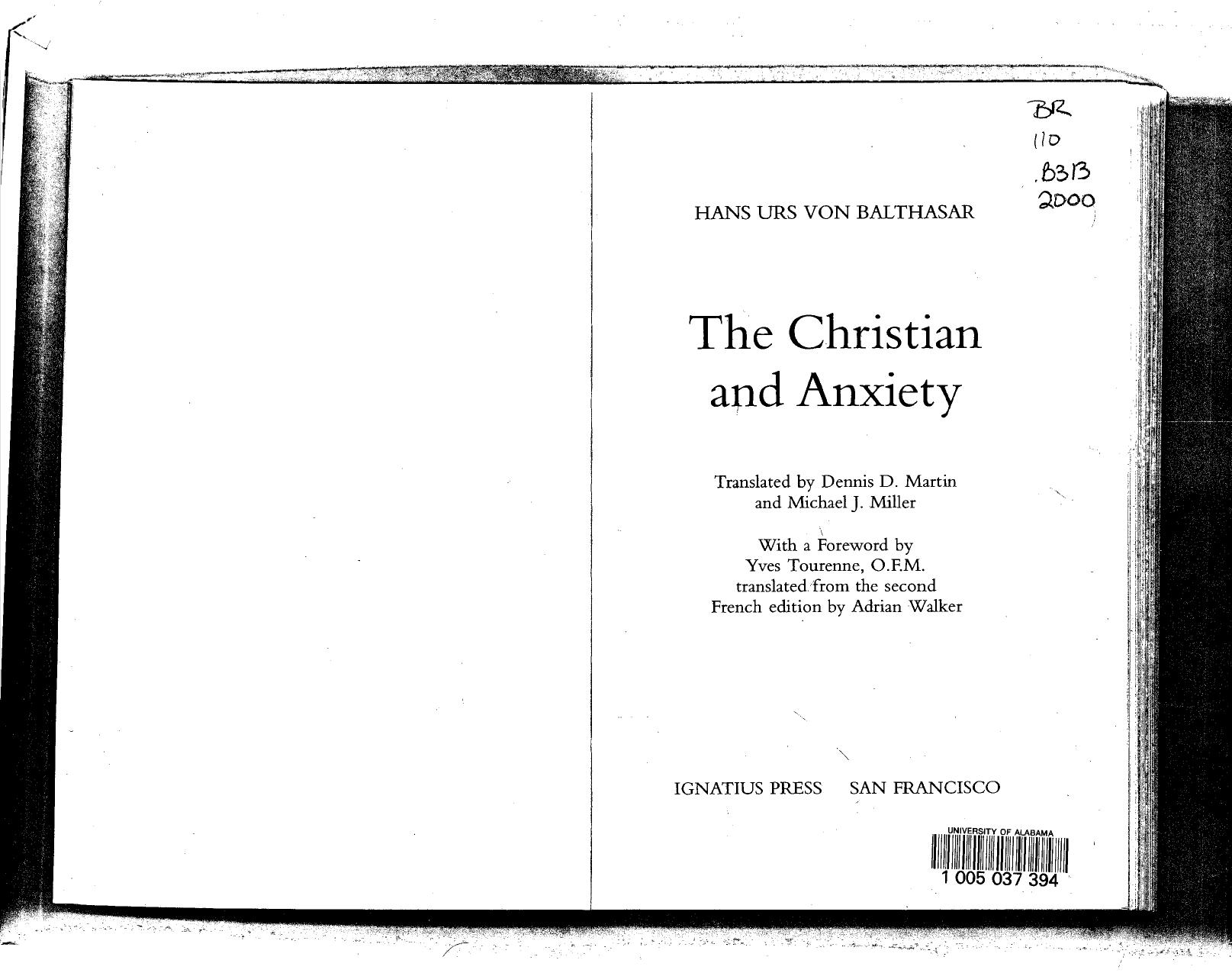The Christian and Anxiety by Hans Urs von Balthasar

Author:Hans Urs von Balthasar [Balthasar, Hans Urs von]
Language: eng
Format: epub, pdf
Tags: Spiritual & Religion
ISBN: 9780898705874
Publisher: Ignatius Press
Published: 2011-09-30T00:00:00+00:00
III
THE ESSENCE OF ANXIETY
As we go back down to the question of the essence of anxiety we do not leave the theological realm behind; rather, as we seek to understand more deeply what has been revealed, we bring to bear whatever our reason is capable of contributing to the subject. In other words, we make use of philosophy, so long as this is understood to be what it is and what it alone can be; the reflection of the human mind on the first principles and causes of this concrete world. As revelation shows us, this world was never a âpurely naturalâ world, but rather one created by God within the ambit of supernatural grace and ordered to a single supernatural end: the contemplation of God. Even in falling away from him the world has not become a âpurely naturalâ world but remains in every respect nestled in the supernatural. Thus the object of philosophy is from the outset something more than philosophical (if one considers grace and revelation as belonging to the specific object of theology), particularly since human reason, which is both object and instrument of philosophical work, never was or will be any more âpurely naturalâ than the ânatureâ from which it arises. So little basis is there for such a claim that one can go ahead and postulate and formulate the concept of a nature entirely separated out from the supernatural, but the lack of adequate data from experience and observation makes the constructive development of such a concept impossible for the philosopher. Nature as we know it is the nature that is moved and moving between the Fall and redemption, intrinsically affected by both modalities to such a degree that not even the speculative reconstruction of the original nature in paradise (which as a real âstateâ stands even closer to nature as it now exists) is possible without contradiction, let alone a never realized state outside of any relationship to the supernatural. As long as the philosopher resigns himself to this restriction imposed upon him by revelation, denying him a field of endeavor that would be fully independent of revelation (because there is no âgraceâ without ârevelationâ, since the ontological and epistemological sides of Godâs supernatural self-disclosure are intimately connected), the contribution of philosophical reflection within theological investigation is most welcome, indeed, indispensable. After all, what else should the science of theology use to build itself up if not the reflective labor of reason?
Therefore this work yet to be accomplished is not exclusively a matter of further and more fundamental analysis of the biblical texts as such; rather, in the light of what is revealed in them, it is a matter of analyzing human reason and human nature insofar as they are affected by that light. For revelation expressly invites human reason and nature to think about and understand themselves anew within the declarations arid predications issued by the Word of God. A wide-open field is allowed for this activity: human reason can legitimately bring
Download
The Christian and Anxiety by Hans Urs von Balthasar.pdf
This site does not store any files on its server. We only index and link to content provided by other sites. Please contact the content providers to delete copyright contents if any and email us, we'll remove relevant links or contents immediately.
What Is the Gospel? (Foreword by D. A. Carson) by Greg Gilbert(783)
Daily Strength: Devotions for Bible Believing Study by Douglas Stauffer & Andrew Ray & Rick Quatro(746)
Veritas: A Harvard Professor, a Con Man and the Gospel of Jesus's Wife by Ariel Sabar(641)
New Morning Mercies by Tripp Paul David(640)
The Practice Is the Path by Tias Little(630)
Christian Ethics by Wilkens Steve;(571)
Cleaning Up Your Mental Mess by Dr. Caroline Leaf(544)
Greatest Mystery in the World by Og Mandino(540)
2084 by John C. Lennox(434)
The Creative Call by Janice Elsheimer(433)
No More Christian Nice Guy by Paul Coughlin(430)
Our Appointment with Life by Thich Nhat Hanh(425)
This One Wild and Precious Life by Sarah Wilson(417)
The Duties of Parents by J.C. Ryle(414)
Monastic Archaeology by Unknown(408)
A Closer Talk with God: Scriptural Prayers for Women by Kim Trujillo(381)
The Tale of the Tardy Oxcart (Swindoll Leadership Library) by Swindoll Charles R(371)
Jesus and the Lost Goddess by Timothy Freke(360)
I AM THAT I AM: 365 Daily Meditations by Nadine Sabulsky(359)
